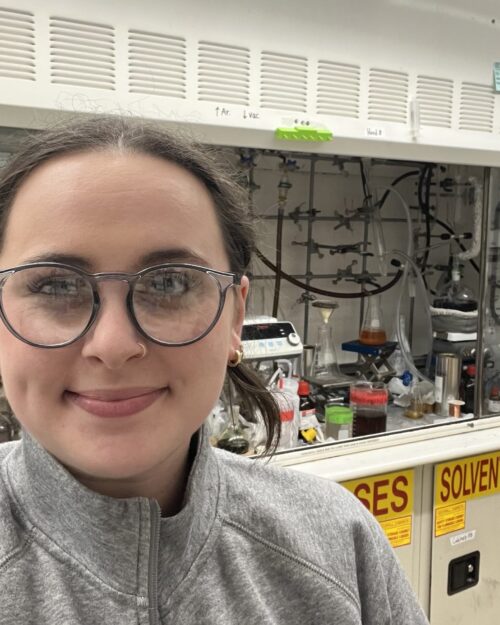June 27, 2025

By Victoria Cinnater, PhD candidate and outreach specialist for AEOP’s Internships and Fellowships program.
In the last blog post, I shared a bit about my role as an outreach specialist for AEOP Internships and Fellowships, a position that reflects my passion for supporting students. That dedication to mentorship is rooted in the challenges I faced as a younger graduate student. In upcoming posts, I look forward to sharing the insights I’ve gained to support you, whether you’re a high school student exploring a future in STEM or an undergraduate figuring out your next steps.
In this blog post, we’ll explore whether graduate school is the right path for you, and if so, whether a Master’s or a Ph.D. makes the most sense.
First, Ask Yourself: “What Do I Want to Do After I Graduate?”
- If you’re planning to go to medical, dental, law, nursing, or veterinary school, those are called professional programs. They’re designed to prepare you for specific, licensed careers, and while rigorous, they’re not technically considered “graduate school” in the traditional academic sense. (Yes, students wanting to pursue STEM professional programs should still explore opportunities with AEOP!)
- If you’re curious about research and want to be a trailblazer in your field, then graduate school might be for you (and so is this blog post!)
So, You’re Thinking About Grad School: Master’s or Ph.D.?
Graduate school offers advanced degrees such as a Master of Science (M.S.) or a Doctor of Philosophy (Ph.D.), each with different time commitments, structures, and outcomes. The first step in choosing the right program is to ask yourself a few important questions:
How long do I want to stay in school?
- A Master’s degree usually takes 1 to 3 years, depending on whether it’s full-time, part-time, or research-based.
- A Ph.D. can take anywhere from 5 to 7+ years, with the timeline depending on your research progress, program structure, and field.
Master’s programs often follow a set curriculum and timeline, while Ph.D. programs are typically more flexible and open-ended.
What do I want to focus on in grad school?
- Master’s programs typically come in two main forms:
- Professional Master’s programs are primarily coursework-based and focus on building career-ready skills.
- Research-based Master’s programs combine classes with small-scale research projects.
- Ph.D. programs combine advanced coursework, teaching experience, and intensive research culminating in a dissertation. The goal? To contribute original knowledge to your field and become an expert in it.
What do I enjoy about STEM?
If you love solving open-ended problems, designing experiments, diving deep into complex topics, and pushing the boundaries of what we know, then a Ph.D. might be a fulfilling path.
If you’re more drawn to applied skills, career growth, and applied problem-solving (with a faster timeline), then a Master’s may be a better fit.
What are my long-term career goals?
| Goal | Recommended Degree |
| Deepen expertise in a technical field | Master’s or Ph.D. |
| Work in research or academia | Ph.D. |
| Teach at the college/university level | Usually requires a Ph.D. |
| Switch fields or gain new skills quickly | Master’s |
| Advance in industry without long-term study | Master’s |
How much can I afford to pay?
Master’s programs are often self-funded, meaning you might have to cover tuition and living expenses yourself or through student loans. Some offer scholarships or assistantships, but funding is less common.
Ph.D. programs in STEM are typically fully funded—tuition and student fees are covered, health insurance is included, and you receive a monthly stipend to help with living expenses (I’ll explain how that works in the next blog post!)
Quick Takeaways
Here’s a quick summary to help guide your decision:
| Master’s Degree | Ph.D. Degree | |
| Length | 1 to 3 years | 5 to 7+ years |
| Focus | Coursework, skill development, or career advancement | Original research and subject expertise leading to dissertation, includes coursework and usually a teaching component |
| Funding | Often self-funded | Usually fully funded (in STEM) |
| Goals | Advance career, gain technical skills, explore field | Become an expert, lead research, or pursue academic roles |
Need Help Deciding?
If you’re still unsure which path is right for you, don’t worry, you’re not alone! Try meeting with a trusted mentor to discuss your goals, interests, and any questions you may have about graduate school. A quick conversation with a high school teacher or college professor can also provide clarity.
Up Next
In my next blog post, I’ll dive deeper into how graduate school funding works, including stipends, assistantships, fellowships, and where that money actually comes from.
*These insights are based on my experience as a Ph.D. candidate in chemistry at a private university and may differ from those of others.

Undergraduate Internships
Undergraduate students have the unique opportunity to conduct real-world, U.S. Army-sponsored research alongside scientist and engineer mentors in world-class facilities at university labs or U.S. Army Research Laboratories and Centers.
More About Undergraduate Internships
High School Internships
High School students work one-on-one with a university researcher or DoD scientist mentor during this authentic science and engineering research internship.
More About High School InternshipsFind a Volunteering Opportunity
Visit our Program Volunteers page for a tool to find the best opportunity for you.
eCYBERMISSION Mini-Grant
The eCYBERMISSION Mini-Grant is intended to support teachers/program leaders as they implement eCYBERMISSION with their teams. Educators (formal and informal) of students in grades 6-9 are encouraged to apply.
